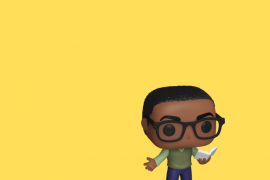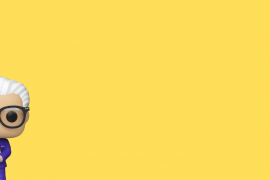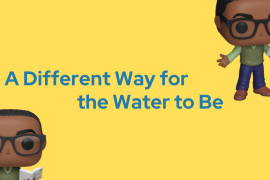ELEANOR AND JANET SIT SIDE-BY-SIDE ON A SIMPLE WOODEN BENCH IN AN IDYLLIC WOOD, sharing a peaceful moment of deep significance – and a pitcher of margaritas. It is a moment perfectly profound and at the same time slightly irreverent, the kind of synchronistic scene only The Good Place can create. Eleanor, finally, is ready. But for what, she doesn’t exactly know. And finally, Eleanor accepts that. As Janet once before told her, “True joy is in the mystery.”
The mystery of what lies beyond that archway occupies much of the last season, and certainly the last episode, of The Good Place. It is in some ways the defining, culminating symbol of the show. It’s what they had all worked for – a perfect solution. And it is the only way that this journey could have ended, but not because it’s the perfect solution. Precisely because it’s not.
In literature, thresholds, like the Good Place archway, appear as symbols of change, transition, as rites of passage. Thresholds commonly show up along heroes’ journeys, often as their first choice and test of determination. By boldly crossing over a threshold, the hero leaves behind her old world and enters a brave new one. Heroes are rewarded for their choice to cross their threshold and embark upon their journey by riches, thrones, accolades, literal worship.
Eleanor, Jason, Chidi, Tahani, Michael, and Janet are the heroes of the universe. They legitimately saved humanity. Through this mysterious and alluring archway tucked deep in the Good Place, they created a way to make heaven, well, even more heavenly. By creating the choice to go through the doorway, to cross the ultimate threshold, they have made the Good Place even more perfect, and themselves into heroes.
After you’ve made it to the Good Place, and experienced as many Bearimies as you want, doing exactly what you want, you can choose to walk through the door. Whenever you’re ready. It’s a beautiful system, really, knowing how human nature works. We only really enjoy what we consider special, fleeting, ephemeral. So how can you make eternity finite, so it doesn’t become just another hell, with zombie-like Hypatias ambling along, begging to be saved? You let people choose when to leave it, on their terms.
The introduction of the doorway, however, is not all peace and happiness. It brings with it real pain: the pain of losing someone you love, the angst of having to make an eternally weighty decision, and the existential fear of walking into something unknown. In this, the doorway allows them to feel human again. It’s not all pleasure and enjoyment forever – humanity is pain and loss as well. We can’t have one without the other and still feel fully human. The solution to the Good Place problem wasn’t technically perfect – it introduced another set of challenges into the environment – but it was perfect, even in its messiness and complication, because it allowed them the chance to feel again. As Jason explains, he felt deeply and surely, once he was ready, that it was his time: “All of a sudden I had this calm feeling, like the air inside my lungs was the same outside my body. It was peaceful.”
Unfortunately for us down here, life usually doesn’t give us “whenever you’re ready.” We don’t get to wait until the peaceful feeling washes over us and the air in our lungs feels at one with the air around us. Life just happens, and usually, it knocks the air right out of us. It doesn’t ask if we’re ready to walk through whatever door is in front of us. It pushes us through. Like now, as we have each been thrust into the strangest of thresholds. We didn’t choose the virus. We didn’t go into 2020 thinking we would spend several months (at the least) in global quarantine. We didn’t ask to walk through this door. We didn’t enter this new world because we chose to, or were ready. It just happened.
Most of us, when we stand on the edge of a doorway, don’t feel like heroes. We don’t tend to look at change and uncertainty with bravery and chivalry; when forced into transition, we go kicking and screaming, clutching the doorframe for dear life. Even if, in the deepest part of us, we know that what was might be nothing in comparison to what will be, we don’t like to let go. We’re scared.
Much like Eleanor was, up until those final moments. Scared of opening herself up to grief, to loss, to uncertainty. In holding onto Chidi, she clung to the life she had created in the Good Place, and didn’t want to open the door to what grief laid ahead. Like Eleanor, we’ve either experienced or will inevitably experience other people walk through the door, away from us and out of our lives forever. And nothing can make us feel ready for that.
But life rarely cares, and the virus certainly didn’t. Globally, collectively, we’ve all been shoved to the edge of a formidable threshold. We’re here, in the in-between. We know that the old world is gone. But the new one has yet to emerge from its governmentally enforced hibernation. So we’re here, sitting on the bench, and we get to choose how we respond. We may not have chosen to be here, we didn’t come to the edge of this doorway because we felt that “quietude in [our] souls,” like Chidi described. But we can choose to find it, to look for it if we want.
Thresholds are places of change, and are therefore the perfect teachers in the art of holding many things at once. Every transition holds promise and anticipation, and at the same time, loss and grief. Nothing beautiful comes without a price. We, in the West, have not been taught this well, how to let two seemingly contradictory truths exist simultaneously and equally. Chidi, in his last moments with Eleanor, gets one more chance to relay his moral wisdom. When Eleanor asks for Kant or John Locke – two of the most well known Western philosophers – Chidi denies her request. “They wrote mostly about rules and regulations,” he responds. For spiritual matters, he turns to the East.
Because in these moments, in that liminal space of impending change, we don’t need rules. We need something that can help us hold the promise and hope alongside the grief and heartache. Eleanor searching for the terms of moral justification, for a way to justify her rule that Chidis shouldn’t leave because it would make Eleanors sad, will never turn up. Because our experiences, and our array of emotions within and about them, aren’t easily packaged in a rule. Eleanor will be sad when Chidi leaves – of course she will. She will be heartbroken. We all were. But that doesn’t mean he shouldn’t leave. The existence of pain and heartache do not prevent the emergence of beauty and promise. It calls them forth; the darkness of night bringing forth the majesty of the dawn.
Chidi, after his life’s search for verifiable truth in the West’s best thinkers, turns elsewhere in the moments before crossing the threshold. He knows what Michael also knew, when he told Janet, in anticipation of Jason’s walk through the doorway, “It’s ok if you’re sad too.” Chidi knows, as the picture of the wave has taught him, that he’s returning to where he came from, to where he’s supposed to be. There’s nothing more beautiful than that. And he also knows it’s ok to be sad. He wants Eleanor to know that too. Like yin and yang, the ancient Eastern image of the inextricable, eternal coexistence of opposing forces, grief and joy mingle under the shadow of the threshold before them. There’s nothing more human than that.
Eleanor, however, isn’t ready to enter the doorway. Because she has yet to come to terms, for herself, with the ultimate truth of being human. Which is that a lot of times, it sucks. And a lot of times, it’s amazing. Because, to us, our pain, so ever present in this life, always seems so big when we’re in it. The bad places of our lives feel big and dark enough to overshadow the joy and hope that, if you look for them, are there, pulsing through the ground beneath us. Our grief is always the worst grief. Eleanor’s overwhelming sadness at losing Chidi knocked her breathless. Certainly, that is real grief. But the confidence in how right it was, both for Chidi, and one day, when she’s ready, for Eleanor, to return to the water, made the sadness a piece of the puzzle, rather than the whole picture.
When that realization, that both of those things are equally, and often simultaneously, true, comes to Eleanor after helping Michael, she’s finally ready. Back with Janet, beholding the archway, Eleanor shares what she thinks Michael’s life on Earth will be like – in the end, what all of our lives are like: “Some good days, some bad days. He’s got a few friends, a few people he can’t stand. He’s learning some things all by himself, and hopefully, learning to ask for help when he needs it. He’s messing up and trying again, and messing up again, and then getting things wrong and trying to make them right. That’s what everyone does.”
Even in the Good Place, where all should be well, we see our favorite after-life heroes confront the same eternal struggle as us still Earth-dwelling mortals when we’re at the edge of a doorway. It’s hard to know how to hold it all at once, to let heartache and anticipation each have their place, neither one diminishing the other, but each making the other more whole.
The doorway in the woods shows us what it means to live well. We rarely know what’s on the other side of any of life’s biggest thresholds. Oftentimes, we don’t get to choose when we face them. Our time in the in-between, liminal space doesn’t often look as picturesque as it does as the beautiful Good Place woods. But we do have the same choice as they do. We can look for that quietude in our souls. We can search for the kind of peace that makes the air in our bodies feel at one with the air around us. We can reconcile all the heartache and grief of what we may be leaving behind with the promise of what may lay ahead. We can even take a note from Jason (never thought I’d say that), and spend some time letting our minds drift away and contemplate eternity – kind of like a monk. Even when – actually, especially when – we don’t choose to come to the brink of something new, we can, however, choose how we live into it.
In the time of COVID-19, the choice of how we live in the face of this strange twist of fate lies with each of us. We have faced countless thresholds in our lives before now, and will have innumerable more in the years ahead. But the door in front of us right now is what matters, because our choices now can help lay the foundation for every other choice we will make in this life (and maybe in the next one?).
The Good Place begins with an invitation to walk through a doorway. Eleanor will walk out of that emblematic waiting room, and through the door in Michael’s office – as well as countless other doors placed throughout the show – thousands more times. With each new re-entry into Michael’s office, or foray back to Earth through the portal, or step into Chidi’s apartment, Eleanor comes closer to discovering what she finally knows at the end of it all. To be human is to love, and to grieve, and to hope and to despair, often all at once. It’s acting in faith of a world that is good, filled with people who are good, even when you don’t know what will happen in the end, or even tomorrow. That’s the mystery, that’s the joy.
After it all, at the end, Eleanor understands what her life, and her afterlives, have been about. She finally feels the call. One last time, Eleanor answers the invitation to “Come on in.” She doesn’t know where it will take her. But this time she knows, deeply, that everything is fine.
NEW book release
I’ll Tell You a Love Story by Couri Johnson. Order the book of which Tim Jeffries said, “Surprising in their originality, filled with broken wisdom, and with a refreshing use of language and imagery, these are stories to savour and mull over one at a time but which add up to a satisfying whole.”
GET THE BOOKLike what you’re reading?
Get new stories or poetry sent to your inbox. Drop your email below to start >>>
OR grab a print issue
Stories, poems and essays in a beautifully designed magazine you can hold in your hands.
GO TO ISSUES



